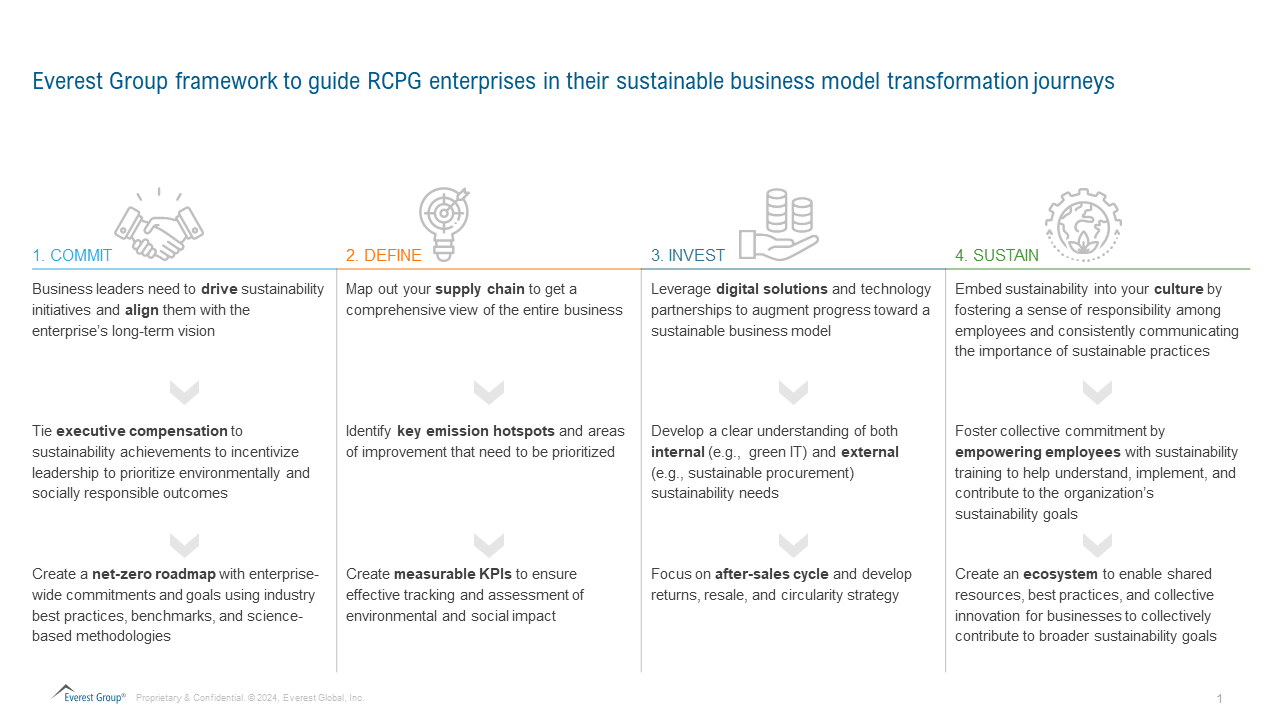Blog
Sustainability in Retail and CPG: A Reactive Approach Will No Longer Work

to speak to an analyst on this topic.
Sustainability has long been a pivotal issue, but changing consumer behavior, a shifting regulatory landscape, and escalating climate change impacts have intensified pressure on industries to address their Environmental, Social, and Governance (ESG) footprint. Our recent research revealed that:
79% of consumers are willing to switch brands based on their environmental and social practices.
5% of revenue is the cost of waste and waste disposal on average for retailers and CPG companies.
Companies with consistently high ESG performance tended to score more than 2x on total shareholder return than those with medium ESG performance.
The retail consumer packaged goods (RCPG) industry is now more committed than ever to sustainable practices, recognizing the urgency of integrating sustainability in retail and CPG operations. This involves mitigating climate risks, enhancing long-term resilience, and contributing to a sustainable future through technological investments, product innovation, supply chain optimization, and transparent disclosures. Many firms have embarked on the journey to become purpose-driven organizations, embedding sustainability into their core business strategies.
From our analysis, the following key areas emerge:
- ESG data management: Centralized systems for collecting and analyzing ESG data help companies track their sustainability performance and identify areas for improvement. These systems enhance operational efficiency by automating data collection and reporting processes.
For instance, Walmart leverages an ESG data management system to track and report its sustainability performance, focusing on monitoring energy consumption, carbon emissions, and waste management
- Supply chain traceability: Advanced technologies like blockchain and IoT enable companies to monitor their supply chains in real-time, ensuring transparency and accountability from source to shelf. This helps in managing ethical sourcing and reducing the risk of supply chain disruptions.
For instance, Nestlé uses blockchain technology to track milk and palm oil supply chains, ensuring sustainable and ethical sourcing while providing transparency from origin to the final product
- Climate risk analytics: Predictive analytics tools assess the impact of climate change on business operations, enabling companies to proactively mitigate risks. These tools support scenario planning and help attract investment by demonstrating a commitment to managing environmental risks.
For instance, PepsiCo uses predictive analytics tools to evaluate the impact of climate change on agricultural supply chains. This allows the company to develop strategies to mitigate risks related to crop yields and water availability, ensuring long-term sustainability
- Circular economy practices: Embracing circular economy principles, such as using recycled materials and designing products for longevity, helps reduce waste and resource consumption.
For instance, SHEIN has launched a new apparel collection made from “deadstock,” the excess, unsold, and leftover fabric inventory that is typically discarded by fashion brands. SHEIN is utilizing Queen of Raw’s proprietary software, Materia MX, to source existing materials from brands and retailers looking to responsibly clear out their excess fabric inventory rather than have it go to waste in landfills
- Sustainable Consumer Experience: Digital labels and QR codes provide consumers with detailed information about the sustainability attributes of products, enhancing transparency and building brand loyalty.
For instance, Patagonia uses QR codes to provide customers with detailed information about product sustainability, enhancing consumer trust and reducing the need for single-use tags, thereby promoting a more sustainable consumer experience
- Waste minimization: Advanced inventory management systems and IoT sensors help companies monitor stock levels in real time, reducing waste from overstocking and spoilage.
For instance, Tesco uses IoT technology for real-time inventory tracking, reducing waste from overstocking and spoilage, enhancing sustainability by ensuring products are sold before expiration
A framework to guide RCPG enterprises in their sustainable business model transformation journey
As enterprises navigate the transformation to derive more value from their sustainability investments, The Everest Group framework for guiding Retail Consumer Packaged Goods (RCPG) enterprises in sustainable business model transformation involves four key steps: Commit, Define, Invest, and Sustain. This approach provides a structured path to integrating sustainability into core business strategies.

The outlook for sustainability in retail and CPG
Consumer demand for sustainable products continues to rise as awareness of environmental impacts grows. This drives innovation and investment in sustainable practices, resulting in new products and business models that prioritize sustainability. Companies that embrace these changes will build stronger, more resilient brands. Ultimately, successful companies will be those that integrate sustainability into their core strategies, ensuring every aspect of their operations is environmentally mindful. This approach not only contributes to a healthier planet but also creates value for stakeholders and ensures long-term success in an increasingly eco-conscious marketplace. By embedding sustainability into their business models and leveraging advanced technologies, retail, and CPG companies can achieve environmental goals while driving growth and profitability.
Everest Group will continue to follow the evolution in this space. To discuss sustainability in retail and the CPG industry, please reach out to Abhishek Mundra, [email protected], Ambika Kini, [email protected], and Shraddha Pandey, [email protected].